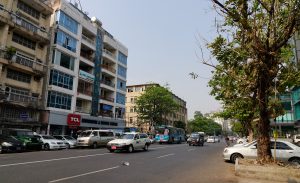The Chinese consulate in Mandalay, Myanmar’s second-largest city, was reportedly attacked with an explosive device on Friday evening, amid reports that junta chief Senior Gen. Min Aung Hlaing is preparing to make a state visit to Beijing.
According to a report in The Irrawaddy, the blast occurred at the consulate on 73rd Street in Chanmyathazi Township, central Mandalay, at around 7 p.m. local time. It quoted a junta officer as saying that the blast came from a grenade that exploded on the consulate roof, but did not provide any more information. The Associated Press cited a junta statement sent to journalists on Saturday evening, which stated that roof tiles on the two-story consulate building were damaged in the attack. The security forces are investigating in order to arrest the “terrorists” behind the blast, it said.
The area around the consulate was later cordoned off, the report stated, adding that no deaths or injuries were reported.
While there is no indication of who lobbed the grenade, it likely reflects an upsurge in anti-Chinese sentiment in Myanmar that has followed reports of Min Aung Hlaing’s upcoming state visit to China.
Last week, The Irrawaddy, citing anonymous sources, said that China was preparing to host the junta chief later this month, a report that was later confirmed by BBC Burmese. The Irrawaddy reported that Min Aung Hlaing could meet with Chinese Premier Li Qiang, to discuss the “election” that the junta has planned to hold sometime in 2025. The visit, if confirmed, would mark a major shift in China’s approach to the country’s conflict.
Despite being a major arms supplier to Min Aung Hlaing’s regime, China has been largely ambivalent about the coup regime, holding it at a degree of diplomatic remove. Beijing has refused to invite Min Aung Hlaing to the country, while other high-ranking junta officials have generally been invited not on a bilateral level but to attend conferences or other multilateral events. This reflected both the uncertain situation in the country, and the extent to which the coup has complicated China’s economic and strategic interests in Myanmar.
But things appear to have changed over the past year as the junta’s military position has deteriorated in many parts of the country, including in Shan State along the border with China. As I noted last week, the Chinese government which has begun expressing strong support for the junta’s planned election as a potential off-ramp, has pressured ethnic armed groups in border areas to halt their attacks on the junta and has ramped up arms shipments to the junta, including, in August, possession of six additional Chinese-made FTC-2000G fighter jets.
During an August 27 meeting with leaders of the United Wa State Army (UWSA), China’s Special Envoy for Asian Affairs Deng Xijun reportedly said that neither the NUG nor the National League for Democracy can “replace the military’s role,” according to a leaked document published earlier this month by Myanmar Now. He also reportedly said that China will not accept a collapse of the regime or victory by the resistance, which it deems to be “close to Western countries.”
All of this appears to suggest that China a) fears the collapse of the military junta; and b) that such a collapse would be detrimental, if not fatal, to its strategic interests in Myanmar, which involve integrating Myanmar into a China-centered regional economy, preventing the spread of Western influence, and opening a corridor between Yunnan province and Myanmar’s Indian Ocean coast.
It is hard to imagine that the attack on the Chinese consulate in Mandalay, minor as it was, was not related in some way to the growing Chinese backing for the Myanmar military, if not to Min Aung Hlaing’s reported state visit to China in particular. Similarly, in late 2021, two bombs exploded near the Cambodian embassy in Yangon preceding a controversial state visit to Myanmar of the country’s then Prime Minister Hun Sen.
China has long been viewed with suspicion in Myanmar, both on the streets and in the halls of power, and many of those who resisted the coup of February 2021 spoke darkly (though probably falsely) of Chinese involvement in (or approval of) the takeover. The fact that China maintains close ties with ethnic armed groups based along the Chinese border, such as the UWSA, has also been a subject of concern – including within the Myanmar military itself.
The attack suggests that any increase in Chinese support, even if that support still stops short of an active intervention in Myanmar’s conflict, will be marked by a parallel deterioration of China’s reputation and image among the bulk of the population that opposes the military junta. What impact this negative public sentiment will ultimately have on China’s strategic goals in Myanmar remains unclear. The opposition National Unity Government has gone out of its way to say that it does not oppose Chinese interests in Myanmar and will respect them should it take power. Likewise, upon taking office in early 2016, Aung San Suu Kyi’s National League for Democracy quickly learned that it could not avoid dealing with China, with which it soon established a constructive, if occasionally uneasy, relationship.
At the same time, a smart Chinese policy would seek to avoid alienating the Myanmar public and inflaming the anti-Chinese sentiment that has never been far from the surface. This is the case particularly in Mandalay, where Chinese immigration has long been a subject of controversy. Throwing its support behind the military junta, at the very moment when its downfall appears to many of its opponents to be within sight, will likely shadow China’s reputation for years to come, whether or not the junta collapses.

































